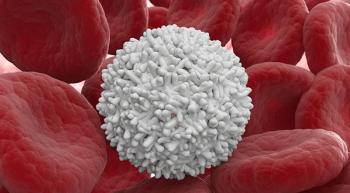
Adavosertib decreased the risk of disease progression or death by 65% in patients with TP53-/RAS-mutant metastatic colorectal cancer (mCRC).

Gina Mauro currently serves as Vice President of Content at MJH Life Sciences, overseeing OncLive®, Oncology Nursing News®, and Medical World News®. Gina joined the company in 2015 and has held various positions on OncLive and Oncology Nursing News. Prior to joining MJH Life Sciences, she worked at Gannett as a full-time reporter with the Asbury Park Press. Email: gmauro@onclive.com

Adavosertib decreased the risk of disease progression or death by 65% in patients with TP53-/RAS-mutant metastatic colorectal cancer (mCRC).

Adherence to current clinical guidelines may contribute to systematic underdiagnosis in Black women, says Kemi M. Doll, MD, MS.

Bispecific antibodies like amivantamab-vmjw, zenocutuzumab, and tarlatamab, are novel in the landscape of lung cancer treatment due to their ability to bridge cells and inhibit tumor growth.

Recently approved combination therapies have contributed to significantly improved survival rates in renal cell carcinoma.

Preliminary study results recently presented at the 2021 European Association of Urology Congress demonstrate that the safety profile of the combination of Bacillus Calmette-Guérin (BCG) and mitomycin is comparable to BCG alone.

The FDA has approved asparaginase erwinia chrysanthemi (recombinant)-rywn (Rylaze) as a complement of treatment for the most common childhood cancer.

The efficacy of CYNK-001 will now be studied with patients with relapsed/refractory AML.

Sotorasib produced continued durable clinical benefit in patients with pretreated KRAS p.G12C+ NSCLC.

Nivolumab with or without ipilimumab improved survival over ipilimumab alone in patients with previously untreated advanced melanoma.

The FDA has granted an accelerated approval to loncastuximab tesirine for the treatment of adult patients with relapsed/refractory large B-cell lymphoma following 2 or more lines of systemic therapy.

The FDA has approved idecabtagene vicleucel as the first BCMA-directed CAR T-cell therapy for patients with relapsed/refractory multiple myeloma after 4 or more prior lines of therapy, including an immunomodulatory agent, a proteasome inhibitor, and an anti-CD38 monoclonal antibody.

Anthracyclines and taxanes remain a backbone in the early-stage setting of triple-negative breast cancer as further evaluations of immunotherapy in the neoadjuvant and adjuvant settings needs to be conducted—efforts that will continue to shape the treatment paradigm.

The FDA has approved TheraSphere™ Yttrium-90 Glass Microsphere for the treatment of patients with hepatocellular carcinoma.

Pembrolizumab (Keytruda) combined with ipilimumab (Yervoy) did not improve survival and had higher rates of toxicity compared with pembrolizumab monotherapy as a first-line treatment for patients with metastatic non–small cell lung cancer (NSCLC) who had a PD-L1 tumor proportion score (TPS) of 50% or greater, and did not harbor EGFR or ALK aberrations.

Balazs Halmos, MD, discusses new advancements in lung cancer that are projected for 2021.

The FDA has approved the Sonalleve MR-guided high-intensity focused ultrasound (MR-HIFU) system for the treatment of patients with osteoid osteoma in the extremities.

The FDA has granted an accelerated approval to naxitamab-gqgk (Danyelza) for use in combination with granulocyte-macrophage colony-stimulating factor as a treatment for pediatric patients 1 year of age and older and adult patients with relapsed/refractory high-risk neuroblastoma in the bone or bone marrow who have demonstrated a partial response, minor response, or stable disease to prior treatment.

The clinical trial planned to evaluate the targeted agent will focus on patients with relapsed/refractory clear cell sarcoma.

Tebentafusp (IMCgp100) showed superiority in overall survival (OS) compared with investigator’s choice of therapy in patients with previously untreated metastatic uveal melanoma, according to results of a preplanned interim analysis of the phase 3 IMCgp100-202 trial (NCT03070392).

Pathology is the cornerstone of precision medicine, explained Marilyn M. Bui, MD, PhD, who added that, as a whole, the health care specialty needs to step it up in the diagnosis of sarcomas and the differentiation between the various histological subtypes.

The combination of plinabulin and pegfilgrastim (Neulasta) showed a statistically significant improvement in the rate of prevention of grade 4 neutropenia versus pegfilgrastim alone in patients with cancer undergoing chemotherapy.

The combination of nivolumab (Opdivo) and ipilimumab (Yervoy) elicited an objective response rate (ORR) of 25% and was found to be well tolerated in patients with advanced or unresectable angiosarcoma, according to cohort findings of the phase 2 DART trial (NCT02834013) that were presented during the virtual SITC 2020 Annual Meeting.

In an effort to further improve outcomes without sacrificing tolerability, the combination of cabozantinib (Cabometyx) with pembrolizumab (Keytruda) is being evaluated in patients with advanced melanoma in a phase 1b/2 study (NCT03957551), according to a virtual presentation during the 2020 SITC Annual Meeting.

There is still a great deal to learn about the optimal use of BRAF-targeted therapy, as well as immunotherapy, in the adjuvant setting for patients with melanoma.

There has been exciting progress for the treatment of melanoma in recent years, but there is still more work to be done.

The investigational wholly-owned allogeneic chimeric antigen receptor T-cell therapy CTX110 demonstrated dose-dependent efficacy and responses in patients with relapsed/refractory CD19-positive B-cell malignancies.

An expert discusses recent advancements in the mantle cell lymphoma space.

The investigational CAR T-cell product AUTO3 in combination with pembrolizumab was found to have a tolerable safety profile and elicit durable complete responses in patients with relapsed/refractory diffuse large B-cell lymphoma.

Patients with mantle cell lymphoma (MCL) who have high-risk biology, including blastoid variant, a Ki-67 score of at least 30%, or high p53 expression, had a significantly shorter failure-free and overall survival (OS), according to results of a retrospective trial.